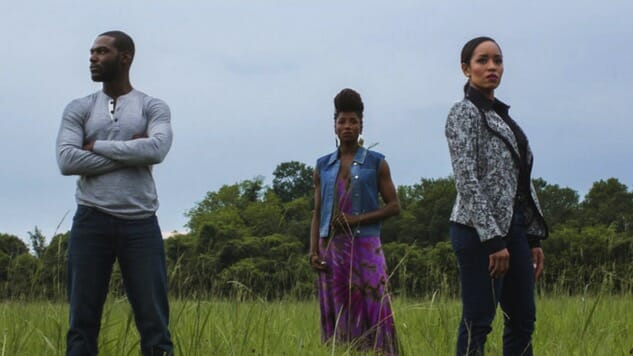An Imperfect Queen Sugar Premiere Still Boasts Poetry and Promise
(Episode 1.01, "First Things First")

It took me months to actually write about Beyoncé’s visual album Lemonade, partly because when it was first released, I just wanted to look at it, over and over again. And that’s what I did, until Paste crowned it the album of the year (so far) and I was asked to write about the content, as well as the beautiful form of the piece. Some works of art are so breathtaking, you just want to celebrate their beauty for as long as humanly possible. Ava DuVernay’s Queen Sugar premiere, “First Things First” is one of those things. I’d go so far as to argue that it’s better at poetry than it is at plot, and so as critics do, I must celebrate that poetry but also critique some weaknesses in the plot, and all that it’s wanting.
The opening scene is stunning—like a near-perfect stanza that makes use of both silence and sound (something DuVernay is somewhat of a master of, as seen in Middle of Nowhere and Selma). We meet Nova (Rutina Wesley) and immediately sense that her character represents that rare human, capable of basking in her own solitude in one moment, then fluidly transitioning to the arms of her lover (as if in a dance), in the next. Throughout the premiere, Nova consistently stands out amongst the other characters, as strong and as strange as the best kind of poetry—a woman who speaks with an incredible clarity, but also seems to hold fast to her secrets.
We are also introduced to her brother, Ralph Angel (Kofi Siriboe), a protective and flawed single father, and Charley (Dawn-Lyen Gardner). Unfortunately, it was Charley’s storyline in the premiere that most distracted from the lovely poetry we experienced otherwise. A woman shaking out her locks, a little boy and his doll, the beauty of Southern land—these things contrasted so sharply (and perhaps, necessarily so) against Charley’s Los Angeles backdrop. Hers is a world where she and her pretty husband Davis West (Timon Kyle Durrett) celebrate their perfect lives and argue about whether or not it’s right to give their privileged son a fat stack of cash in the morning. Charley hops into a droptop Benz and meets two other basketball wives so they can talk about doing a reality show. Charley plays coy and seems resistant to the idea—but something tells us she’s seriously considering becoming a reality star. While all of this is clearly meant to distinguish between the different worlds the siblings (Nova, Ralph Angel and Charley) are living in, it automatically boxes Charley in, and little of the dialogue rings true. And so it’s impossible to feel for these basketball wives (they are really presented as nothing more than that), when their husbands are suddenly caught up in a scandal.
-

-

-

-

-

-

-

-

-

-

-

-

-

-

-

-

-

-

-

-

-

-

-

-

-

-

-

-

-

-

-

-

-

-

-

-

-

-

-

-








































